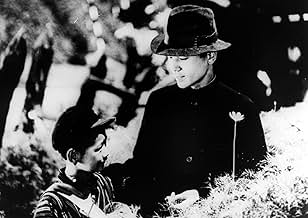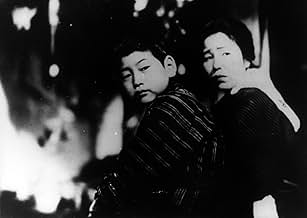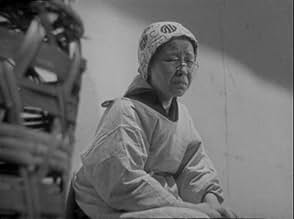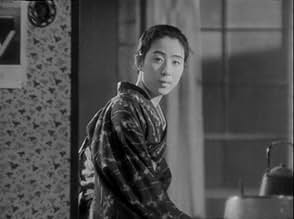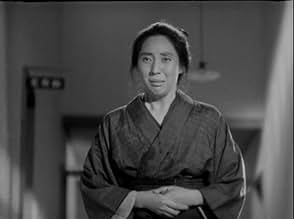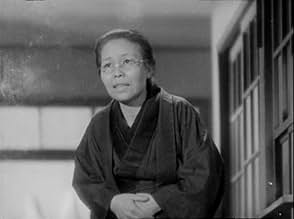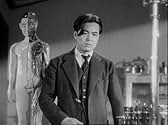IMDb RATING
7.7/10
4.3K
YOUR RATING
A widow sends her only son away to receive a better education. Years later, she visits him, finding him a poor school teacher with a wife and son.A widow sends her only son away to receive a better education. Years later, she visits him, finding him a poor school teacher with a wife and son.A widow sends her only son away to receive a better education. Years later, she visits him, finding him a poor school teacher with a wife and son.
- Director
- Writers
- Stars
Jun Yokoyama
- Okubo's son
- (as Bakudan Kozô)
Tomio Aoki
- Tomibo
- (as Tokkan Kozô)
Seiichi Katô
- Kinjo no ko
- (as Seiichi Kato)
- Director
- Writers
- All cast & crew
- Production, box office & more at IMDbPro
Featured reviews
While having the privileged importance of being great director Yasujiro Ozu's first sound film, The Only Son also remains important for its emergence as the first truly "Ozu" work, in the sense that the very particular cinematic and thematic elements which make up what he is best known for coalesce together in a thoroughly emotional experience.
The story is simple enough, as Ozu usually tells. A widow attempts to save enough money for her son to go to college in Tokyo. She visits him years later, only to discover that he is not living the kind of sophisticated, well-off life she believed he would lead as a result of a college degree. What Ozu does with these characters is astonishing; he shows them in the most serene and simple of situations and settings yet uses his unique directing style to elicit subtle feelings and thoughts simmering just below the surface.
What this seems to suggest is Ozu's feelings regarding Japan in the 1930s, a tumultuous period in which the age of modernization seemed to be waning and Japanese society continued to be pressured into a militaristic hegemony. Clearly, Ozu resisted these transitions and his best offense was the films he made. The result is a quiet, gentle yet intense story about simple people wishing their lives, or the lives of their children, were better than they are. Through this, Ozu seems to reflect on the failure of Japanese innovation up to that point and the uncertainty of what the future might bring. Fortunately for the viewer, his specific style and insight remain as coherent and profound as ever.
The story is simple enough, as Ozu usually tells. A widow attempts to save enough money for her son to go to college in Tokyo. She visits him years later, only to discover that he is not living the kind of sophisticated, well-off life she believed he would lead as a result of a college degree. What Ozu does with these characters is astonishing; he shows them in the most serene and simple of situations and settings yet uses his unique directing style to elicit subtle feelings and thoughts simmering just below the surface.
What this seems to suggest is Ozu's feelings regarding Japan in the 1930s, a tumultuous period in which the age of modernization seemed to be waning and Japanese society continued to be pressured into a militaristic hegemony. Clearly, Ozu resisted these transitions and his best offense was the films he made. The result is a quiet, gentle yet intense story about simple people wishing their lives, or the lives of their children, were better than they are. Through this, Ozu seems to reflect on the failure of Japanese innovation up to that point and the uncertainty of what the future might bring. Fortunately for the viewer, his specific style and insight remain as coherent and profound as ever.
The simple story follows Tsune (Choko Iida), a widow and single mother who struggles in a factory job to provide for her son Ryosuke. She sacrifices everything in her own life to pay to send Ryosuke off to the best middle and high schools, toiling away at her thankless job while never getting to see her son. It's not until many years later, when the now-grown Ryosuke (Shin'ichi Himori) gets a surprise visit from his mother at his Tokyo home, that the two assess their lives.
This was Ozu's first sound film, and he can't help but poke fun at the format, with one scene seeing Ryosuke and Tsune attending a "talkie" movie, the old woman's first, only for her to fall asleep during it. But while there are many moments of gentle humor, this is largely a serious affair, taking an unflinching look at familial obligation and expectation. The film asks what the true measure of a man is. Is it financial success, material wealth, a nice home and fat bank account? Or can it be strength of character and generosity of spirit? Ozu doesn't give any definitive answer, and the final sequence of the film leaves the true feelings of Tsune toward her son rather ambiguous.
This was Ozu's first sound film, and he can't help but poke fun at the format, with one scene seeing Ryosuke and Tsune attending a "talkie" movie, the old woman's first, only for her to fall asleep during it. But while there are many moments of gentle humor, this is largely a serious affair, taking an unflinching look at familial obligation and expectation. The film asks what the true measure of a man is. Is it financial success, material wealth, a nice home and fat bank account? Or can it be strength of character and generosity of spirit? Ozu doesn't give any definitive answer, and the final sequence of the film leaves the true feelings of Tsune toward her son rather ambiguous.
"The Only Son" is Ozu's first "talkie" - and utilizes sounds/dialogue in a stylistic manner to tell a simple story. The beautiful simplicity that pervades the piece is classical Ozu, and amplifies the poignant tale of a mother coming back to visit her son, after sacrificing her livelihood to ensure he achieves higher education. When she realizes that he is unsatisfied with his life as a night-school teacher, a general melancholic tone begins to unfold through the progression of the narrative.
There are some fine indoor shots of the house where the son lives, and also, some greatly composed scenes of the run-down industrial neighborhood where the son goes out to buy "noodles" from a nearby stand. What's also memorable about the film is its excellent rendition of outdoor nature shots, one scene stands out in my mind where the son is having a discussion with his mother. There is also a great shot of the night-school teacher looking out dismal and lonely from the school-building to a city sign, which is juxtaposed against a dark, night sky.
The ending is nicely done, and overall, the film is crafted in that spare, simple perfection that is the stylistic hallmark of Ozu's cinema.
There are some fine indoor shots of the house where the son lives, and also, some greatly composed scenes of the run-down industrial neighborhood where the son goes out to buy "noodles" from a nearby stand. What's also memorable about the film is its excellent rendition of outdoor nature shots, one scene stands out in my mind where the son is having a discussion with his mother. There is also a great shot of the night-school teacher looking out dismal and lonely from the school-building to a city sign, which is juxtaposed against a dark, night sky.
The ending is nicely done, and overall, the film is crafted in that spare, simple perfection that is the stylistic hallmark of Ozu's cinema.
It's quite striking that although this film was made 17 years before Tokyo Story, all the aspects of the film-making style we have come to associate with Ozu are already fully present. But compare this film with, say, his "Sono yo no tsuma", made just six years earlier in 1930: in that film --- a rather slavish attempt to copy the style of German Realism -- none of the visual and narrative features he shows here are present.
No one has mentioned (so I will...) -- that the German film which Ryosuke takes his mother to see (in which she falls asleep, and of which he self-referentially says "this is what they call a talkie") is Willi Forst's 'Leise flehen meine Lieder' (Vienna, 1933), and the lovely blonde actress seen running through the wheatfields is Louise Ullrich. This film (now largely forgotten) was a popular sensation in Europe at the time, depicting the love affair between Franz Schubert and the Countess Eszterhazy. Also... noticeable in a few scenes in Ryosuke's house is a large travel poster which says 'Germany'. All of which shows the extent to which European film-making was in the mind of the young Ozu. We think of Ozu as a purely "domestic" Japanese director (in every sense of that word), but in fact he was well-versed in the traditions of western film-making.
No one has mentioned (so I will...) -- that the German film which Ryosuke takes his mother to see (in which she falls asleep, and of which he self-referentially says "this is what they call a talkie") is Willi Forst's 'Leise flehen meine Lieder' (Vienna, 1933), and the lovely blonde actress seen running through the wheatfields is Louise Ullrich. This film (now largely forgotten) was a popular sensation in Europe at the time, depicting the love affair between Franz Schubert and the Countess Eszterhazy. Also... noticeable in a few scenes in Ryosuke's house is a large travel poster which says 'Germany'. All of which shows the extent to which European film-making was in the mind of the young Ozu. We think of Ozu as a purely "domestic" Japanese director (in every sense of that word), but in fact he was well-versed in the traditions of western film-making.
Incredibly gentle and touching Ozu picture about a single mother who works her butt off to send her only son off to school. Many years later, we follow her journey to visit that son in Tokyo. He hasn't kept in contact very well. His mother doesn't even know about his wife and infant son, nor that he is a grade school teacher, a rather low (and low-paid) position. Simply put, he's embarrassed at the little he has accomplished and he thinks his mother will be gravely disappointed that she went to so much trouble to educate him. The whole situation really hit home, and I was deeply moved by it. The film also features incredible cinematography and editing.
Did you know
- TriviaThis was Yasujirô Ozu's first feature film with all-synchronous dialogue.
- ConnectionsFeatured in A Train Arrives at the Station (2016)
- SoundtracksOld Black Joe
Written by Stephen Foster
- How long is The Only Son?Powered by Alexa
Details
- Release date
- Country of origin
- Languages
- Also known as
- The Only Son
- Production company
- See more company credits at IMDbPro
- Runtime1 hour 22 minutes
- Color
- Sound mix
- Aspect ratio
- 1.37 : 1
Contribute to this page
Suggest an edit or add missing content


